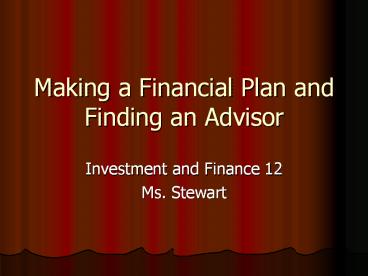Making a Financial Plan and Finding an Advisor - PowerPoint PPT Presentation
1 / 14
Title:
Making a Financial Plan and Finding an Advisor
Description:
Making a Financial Plan and Finding an Advisor Investment and Finance 12 Ms. Stewart What information do I need to build a financial plan? Start by looking at your ... – PowerPoint PPT presentation
Number of Views:114
Avg rating:3.0/5.0
Title: Making a Financial Plan and Finding an Advisor
1
Making a Financial Plan and Finding an Advisor
- Investment and Finance 12
- Ms. Stewart
2
Why do I need a financial plan?
- You wouldnt take a long road trip without a map.
In the same way, you need a road map for your
financial future. - A financial plan looks at where you are today and
where you want to go. Then it leads you through
all the steps you need to take to get there.
3
Five Dangers of Not Having a Financial Plan
- 1) You get what you want today but not be able to
get what you want a few years down the road. - Ex. If you purchase a new car now will you have
the funds to purchase a home a few years into the
future?
4
Five Dangers of Not Having a Financial Plan
- 2) You may do the wrong thing with your money or
get caught up in a scam. Worst of all, you may
end up doing nothing and never reach your goals.
5
Five Dangers of Not Having a Financial Plan
- 3) You may not see the big picture.
- Ex. You may grow your savings, but then pay
more tax on your money than you need to - (If you invest in RRSPs, this is not taxable
income).
6
Five Dangers of Not Having a Financial Plan
- 4) When you get into relationships with other
people and you have no financial plan you could
end up making different choices in terms of
spending and saving money.
7
Five Dangers of Not Having a Financial Plan
- 5) Youll likely have more money worries. You may
not know where you are today or how to plan
ahead. You could even lose control of your money
and not be able to pay bills.
8
Remember!
- NO PLAN, NO PROGRESS
- A financial plan is not about getting rich, and
you dont have to be rich to have one. Its about
doing more with what you have.
9
What information do I need to build a financial
plan?
- Start by looking at your finances today
- What do you own?
- What do you owe?
- What you make?
- What you spend?
- What you hope to achieve (your goals)?
10
What does a financial planner do?
- Set realistic goals and take steps to achieve
them - Decide what type of insurance you need
- Save for your childrens education and training
- Plan and save for retirement
- Build an estate to leave for your family when you
die - Save and invest in smart ways that reduce your
taxes
11
What will you talk about to a financial planner?
- Your personal situation (job, where you live,
married, children) - Your goals (and when you want to reach them)
- Your current investments
- Your tolerance for risk
- Your debts
12
What will you talk about to a financial planner?
- Your insurance
- Your taxes (income tax, property tax)
- Your will
- Your estate (what you will be leaving behind upon
your death)
13
What training does a financial planner have?
- There are no required courses for financial
planners in Canada. The training and education of
people who call themselves planners varies. Make
sure any financial planner you work with has one
of the following designations - Certified Financial Planner (CFC)
- Personal Financial Planner (PFP)
- Chartered Financial Consultant (CH.F.C.)
- Registered Financial Planner (RFP)
14
Remember!
- FINANCIAL PLANNERS LOOK AT THE BROAD PICTURE!
- They will look at who you are, where you are now,
and where you want to be. They will construct a
plan to get you there. Be sure any financial
planner you consult has the proper training to
create a solid financial plan.































